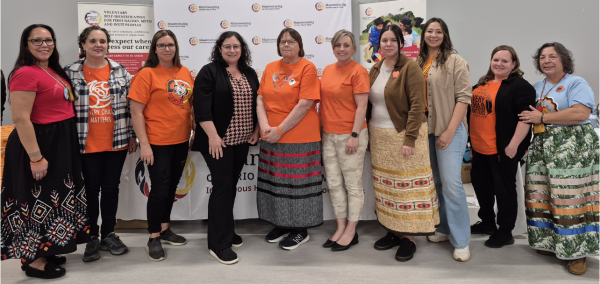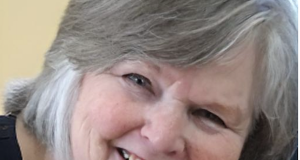
1. Angela Fletcher, RPN Client Care Coordinator, MNSCHS – Northern Clinic, 2. Robin Greer, B.Sc.(Nutr), RD, CDE, Chapleau Health Services, 3. Tracy Martel, Medical Radiation Technologist/Diagnostic Medical Sonographer, 4. Natasha Comte, Co-CEO, Chief Financial Officer & Director of Corporate Services, 5. Irene Armstrong, Integrated Care Manager, MNSCHS – Northern Clinic, 6. Marie-Ève Guitard, Executive Assistant, Chapleau Health Services, 7. Chelsea Blackned, Indigenous System Navigator, Maamwesying North Shore Community Health Services, 8. Melissa McCabe, Executive Assistant of Home and Community Care, Maamwesying North Shore, Community Health Services, 9. Christine Stoycheff, Client Care Coordinator, Maamwesying North Shore Community Health Services – Northern Clinic, and 10. Jacqueline Tangie-Roy, Cultural and Wellness Worker, Maamwesying North Shore Community Health Services – Northern Clinic
Maamwesying North Shore Community Health Services (MNSCHS) Northern Clinic marked the National Day for Truth and Reconciliation with the announcement of a new Indigenous System Navigator (ISN) service. This initiative will provide dedicated support to Indigenous patients and families as they navigate the health care system when admitted to hospital.
The Navigator role will be embedded in Services de santé Chapleau Health Services and Lady Dunn Health Centre, in partnership with both hospitals. Together, they will support members and residents of First Nations communities in the Chapleau and Wawa areas (listed below). The goal is to ensure culturally safe, respectful, and supportive care experiences for Indigenous Peoples.
Who can Access the Service?
The Indigenous System Navigator service is available to:
- Indigenous individuals and families who are members of the four First Nations communities in the
Chapleau and Wawa areas – Chapleau Ojibwe First Nation, Chapleau Cree First Nation,
Brunswick House First Nation, and Michipicoten First Nation, whether they live within their
community or outside of it. - Urban Indigenous individuals and their immediate household members.
Indigenous Self-Identification at the Core
The new Indigenous System Navigator, Chelsea Blackned, will be embedded in both hospitals, with referrals beginning this fall. As this is a new service, implementation will be phased in, with full integration expected by early 2026.
The service is offered to patients who respond “yes” to the Voluntary Indigenous Self-Identification question which is asked at the time of hospital registration: “Do you identify as First Nations, Inuit, or Métis?”
Patients who self-identify and consent will be referred to the Navigator, who will reach out to offer support during their hospital stay.
The new service at Lady Dunn Health Centre and Services de santé Chapleau Health Services is built
upon the many years of experience integrating within our existing partner hospitals. The ISN service has
been operating in Maamwesying partner hospitals since 2010, including Sault Area Hospital, North Shore
Health Network, St. Joseph’s General Hospital Elliot Lake, Espanola Regional Hospital and Health Centre,
and Health Sciences North. This strong foundation means we are not starting from scratch, but rather
from experience, and therefore expanding a well-established service model that has already
demonstrated success.
Navigators play an essential role in ensuring Indigenous patients are supported, respected, and are
connected to community services to ensure a smooth transition from hospital to home.
Leadership Voices
“Many Indigenous people still do not feel safe in the hospital. For those who have experienced racism,
discrimination, or generational trauma, it can trigger fear and anxiety. The expansion of the program to
include our northern community partners enhances our ability to ensure each person feels secure, with
their culture, values, and needs honoured,” says Carol Eshkakogan, Chief Executive Officer of
Maamwesying North Shore Community Health Services.
“The word Maamwesying means ‘the act of working as one’ in Ojibway, and we will strive to work together
to build the inclusive future we envision—where Indigenous people feel valued, where their traditions and
perspectives are honoured, and systemic barriers are addressed.”
“The Lady Dunn Health Centre is working to create a care environment that supports culture and
tradition; we want to be an active participant in addressing health equity challenges that will improve
health outcomes for Indigenous people. We value the partnership with Maamwesying in launching the
Indigenous System Navigator (ISN) service which is one that will assist us in providing inclusive and
culturally safe care,” says Kadean O’Gilvie, Chief Executive Officer of the Lady Dunn Health Centre.
“SSCHS is honoured to partner with Maamwesying North Shore Community Health Services in launching
the Indigenous System Navigator program,” say Services de santé Chapleau Health Services Co-
CEOs, Jamie Fiaschetti and Natasha Comte. “This initiative is a deeply meaningful and much-needed
step toward ensuring culturally safe and respectful care for Indigenous patients and families in our
hospital. We are excited to welcome Chelsea Blackned into this vital role and look forward to the positive
impact her presence will have on the patient experience. This partnership reflects our ongoing
commitment to reconciliation, equity, and building stronger relationships with Indigenous communities.
We are grateful for the opportunity to work together in creating a more inclusive and compassionate
health care environment.”
Building an Inclusive Future
This service expansion represents an important step toward ensuring equitable and culturally responsive
health care for Indigenous Peoples, while strengthening partnerships between hospitals and First
Nations communities in the region.
- Tenaris Commits an additional $78,500 to Support HSCDSB STEAM Lab Programming - February 21, 2026
- Safety Reminder: Keep Children Off Snowbanks Near Power Lines - February 21, 2026
- Une élève de Wawa exerce son leadership au Sénat des élèves du CSC Nouvelon - February 20, 2026
 Wawa-news.com Local and Regional News
Wawa-news.com Local and Regional News

